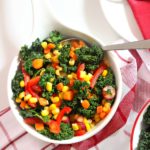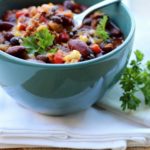A few years ago, The US Food Standards Agency published an extensive report on organic food that concluded with this bombshell: “There is no evidence of a difference in nutrient quality between organically and conventionally produced foodstuffs.“ Although the statement about nutrients may be true (not sure if I`m buying it), the health value and environmental benefits are definitely on a different scale.
What does organic mean anyway?
Under organic production guidelines, conventional non-synthetic pesticides, insecticides and herbicides are generally restricted. Antibiotics and hormones are prohibited from livestock consumption, and genetic modification or application of nanotechnology is generally excluded from organic food. Foods claiming to be organic must be free of artificial food additives, and fewer artificial methods, such as chemical ripening or food irradiation. The use of termite control los angeles is also forbidden for the crops!
Benefits to purchasing organic
- Lack of pesticides in food and environment, which have potential to harm soil, water and wildlife-despite the fact that non-organic foods go through a quality assurance check, there can still be harmful pesticides or other chemicals that are bad for environment present in them
- Help sustain ecosystems
- Organic farms use less energy and produce less waste, thus less impact on our environment
- Some research has showed when compared to conventional products, organic food production resulted in higher levels of vitamins/antioxidants, and omega 3 fatty acids; lower levels of heavy metals, pesticides, and lower risk of food borne illness such as Salmonella.
Negatives of organics:
- Limited use of food preservatives, which may cause short shelf life or quicker food spoilage; however the longer the food takes to get to your table, the lower the nutritive content. Thus, shorter shelf life gives us reason to consume products faster, and we will get more vitamin and mineral value.
- Organics typically cost 10-40% more than conventional products; USDA quoted switching entirely to organics would raise grocery costs by about $45 per month.
At this time, it is felt that it is safe to consume these fruits and vegetables that are grown non-organically.
Avocados
Bananas
Cabbage
Cantaloupe
Eggplant
Green peas
Kiwi
Mango
Onions
Oranges
Pineapple
Sweet Corn
Tangerines
Watermelon
Should you make the switch?
Many have researched the high levels of pesticides in certain foods, frequently termed “The Dirty Dozen”, thus making the switch to organic for these foods in particular is recommended. Research has shown that a high level of pesticides may be toxic to children and those with compromised immune systems (pregnant women, consumers with chronic diseases or those on immunosuppressive medications such as methotrexate, cyclosporine, tacrolomis, or infliximab to name a few). To date, there is not enough research to prove the safety of large doses of pesticides, insecticides and the like, to endorse frequent consumption.
However….
The nutritional content of the dirty dozen is unparalleled, thus it is important not just to abandon those foods altogether. Many a rich source of fiber, Vitamin A, Vitamin C, Folate, and Vitamin K, the risks of avoiding these foods are more dangerous than the potential risk of pesticide overconsumption. What if I peel the outer layer and eat the flesh; does that help? Well, peeling fruit and/or vegetables will remove the most important nutritive layer of the food; the skin of fruits and vegetables is abundant in fiber, and important potentially cancer preventing phytochemicals such as carotenoids and flavonoids.
It is never my intention to post articles that are intended to scare people but the simple fact is that there are pesticides in our food and we have to be aware of that and take precautions. Sometimes it’s easier to ignore all of this but the long term health benefits are worth taking a few extra minutes each week in making your selections.
Pesticide Quantity Broken Down*:
Celery – 64 pesticides
Peaches – 62 pesticides
Strawberries – 59 pesticides
Blueberries – 52 pesticides
Leafy Greens – 51 pesticides
Bell peppers – 49 pesticides
Spinach – 48 pesticides
Apples & Cherries – 42 pesticides
Potatoes – 37 pesticides
Grapes – 34 pesticides
Nectarines – 33 pesticides
Pears – 28 pesticides
Carrots – 26 pesticides
Milk – 12 pesticides
Beef fat – 10 pesticides
Next time you grocery shop, remember the dirty dozen. Choose organics of these more often, perhaps even ½ of the time. The cost may only be about $1/day, it’s worth it in my opinion.
Here is a link to Daphne Oz’s Homemade Fruit and Vegetable Wash. I’ve tried it a few times and it’s the best I’ve found so far.
I’d love to hear your opinions on this and what your choices have been. If you have any helpful information, please share. This is a topic in which we all continue to learn.
Sources
Genetic Literacy Project http://www.geneticliteracyproject.org/2013/05/20/organic-industrys-credibility-erodes-beneath-waves-of-misinformation-about-genetically-modified-crops-and-food/#.Uh8pRtFzbmQ
Advantages of Organic Food http://www.answer-my-health-question.info/advantages-of-organic-food.html
feedkids.com http://feedkids.com/2012/08/organic-vs-conventional-foods/
The Chew http://abc.go.com/shows/the-chew/recipes/Daphne-Oz-Vegetable-Fruit-Wash
Photography: google images











3 Comments
Mindy Whipple
August 30, 2013 at 5:06 pmI agree Robyn and definitely prefer organic. Right now we do buy a mix because of cost which is why I try to grow a lot of our own berries and vegetables. I do go all organic for our garden. I know the more we buy organic the more the farmers will grow organic and the cost will be lower. I have a high incidence of breast cancer in my family and the hormones are a definite concern also for that reason alone. Thanks for all the great information you provide along with the yummy recipes. Happy weekend!
Robyn
August 31, 2013 at 12:31 pmI have the same history in my family, Mindy, so trying to keep as healthy as possible.
I find that the organic vegetables we buy today taste like the ones we had in my grandmother’s huge garden years ago. What happened in the years between? Did we just get used to fruit and vegetables losing their flavours?
I found the same thing when we purchased an free range, organic turkey for the first time about 5 years ago. I couldn’t believe how great it smelled while it was cooking and the taste was reminiscent of childhood days. Somehow all of this has snuck up on us and we’re eating artificial foods. I feel so strongly that it’s time to become very vigilant. Good work on your garden! I’m going to try to add to my home grown produce as well.
SizzleandZoom
September 13, 2013 at 10:32 pmI try to buy organic when it is available. I don’t travel far for it so I think it is worth the extra expense.